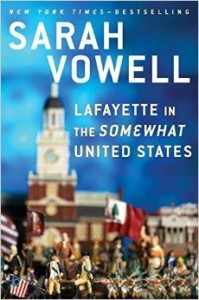 If you are interested in learning more about the Revolutionary War but not interested in reading a dry, boring historical account, you might want to try “Lafayette in the Somewhat United States.” The book is written by Sarah Vowell who describes herself as a ““historian-adjacent nonfiction narrative wise guy.” Her writing is conversational in the extreme and very easy to read.
If you are interested in learning more about the Revolutionary War but not interested in reading a dry, boring historical account, you might want to try “Lafayette in the Somewhat United States.” The book is written by Sarah Vowell who describes herself as a ““historian-adjacent nonfiction narrative wise guy.” Her writing is conversational in the extreme and very easy to read.
Sarah writes, ostensibly, a biography of the Marquis de Lafayette. But instead of a biography, you get a humorous commentary on many of the Founding Fathers and commanders of the army, with the story of Lafayette woven throughout. I also thoroughly enjoyed the drawings done by Vowell of the people she writes about.
 What makes this book most fascinating to me is the parallels Vowell draws between the Second Continental Congress and the one that we have now. Although she pokes fun at government the way we do it today, she also points out that Congress has always been a contentious body that had difficulty doing anything. Can’t pass a budget today? Try outfitting an army in a country that has just declared its independence because of taxation! She actually gave me hope that some of the dysfunction that we see in government today is the way government in a democracy is supposed to work: disagreeing, holding each other back, and only uniting when we find ourselves facing a common, foreign enemy. Even then we might not be able to agree on how to face the enemy. One quote to highlight what I mean:
What makes this book most fascinating to me is the parallels Vowell draws between the Second Continental Congress and the one that we have now. Although she pokes fun at government the way we do it today, she also points out that Congress has always been a contentious body that had difficulty doing anything. Can’t pass a budget today? Try outfitting an army in a country that has just declared its independence because of taxation! She actually gave me hope that some of the dysfunction that we see in government today is the way government in a democracy is supposed to work: disagreeing, holding each other back, and only uniting when we find ourselves facing a common, foreign enemy. Even then we might not be able to agree on how to face the enemy. One quote to highlight what I mean:
“Sullivan’s right and left flanks got spooked and started running away, allowing the redcoats to “concentrate all their fire on the center of our line.” Oh, if only that was the last time in America that the extreme left and extreme right broke down and made a mess of things, leaving everyone in the center to suffer.”
Lafayette is considered the greatest friend the United States of America ever had. In the young, new country he saw a place where the ideal that “all people are created equal” might actually become reality. George Washington was a father figure to Lafayette, as he is to our country. As Lafayette watched events in his native France unfold, he marveled that Americans were managing to hang on to their new country without it imploding. When Lafayette returned to the United States in 1824, he still saw the promise that he felt was unique among nations.
“Lafayette in the Somewhat United States” is odd in that it doesn’t have any chapters. It is one long story with digressions for today and plenty of modern inferences. As someone who reads “one more chapter” before putting a book down, it was hard to put the book down!
Chickamauga and Chattanooga National Military pointed out the differences in how Americans viewed states rights and what it means to be a nation. Kings Mountain National MIlitary Park points out the differences in how Americans view liberty and the right of a government to tax its people. “Lafayette in the Somewhat United States” makes the case that the problems we have in our country today are problems we have had since the beginning. Things may not have changed much in 240 years and they may not change much in the future, but perhaps that is the price we pay for living in a country where we are each free to have our own beliefs and opinions. We will probably always be the Somewhat United States.
